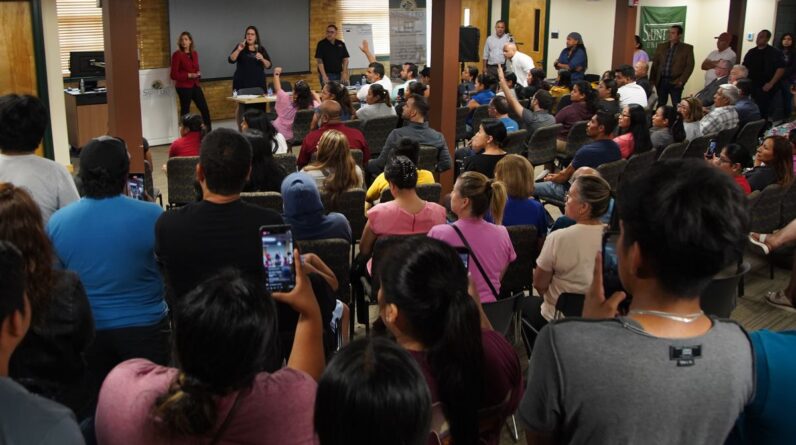
Elda Chafoya didn’t rush to check messages or videos on her cellphone Wednesday as Florida Gov. Ron DeSantis, surrounded by Republican allies in Jacksonville, signed the new immigration law into law.
Instead, she waited until Thursday for answers about how the new law will affect her job as a farm worker in Wimauma and the risks she may face because of her situation in the country.
“There are several things that make me afraid,” said Chafoya, a 32-year-old Guatemalan immigrant and mother of three, all born in the United States.
Chafoya attended a community meeting Thursday night at the University of St. Leo in Tampa, along with more than a hundred immigrants and their families to discuss the legislation, which is scheduled to become law on July 1.
Expands requirements for companies with 25 or more employees to use E-Verify, a registration system operated by the US Department of Homeland Security that verifies the immigration status of workers. The new measure also requires hospitals that accept Medicaid to ask about patients’ immigration status during the admission process and imposes penalties on people who transport someone without legal status to the state, which can result in a third degree felony.
More than a hundred people gathered for a question-and-answer session at the Immigration Town Hall on Thursday, May 11, 2023, in Tampa. [ LUIS SANTANA | Times ]
Rep. Susan Valdes, D-Tampa, organized the meeting with immigration attorneys Milton Marquez and Ananis Makar.
Immigration advocates have criticized DeSantis and his support for the legislation, which aims to crack down on illegal immigration and the influx of newly arrived migrants at the southern border.
Ana Lamb, an immigrant rights advocate who attended the meeting, said the community meetings are important and necessary because of the uncertainty and fear the new law is causing among workers, especially those from Central and South America. south
“Many have begun to wonder what will happen,” he said. “It’s a tough question, but the most important thing is to be informed.”
During the meeting, Marquez and Makar discussed several topics, including mandatory electronic verification, the risks associated with transporting individuals to Florida, and the appropriate steps to take when encountering law enforcement.
Makar said it will be the responsibility of employers to submit their workers’ documentation through E-Verify within three days and follow up on those requests. If a company does not comply with this requirement and a worker is deemed to have no legal personality, the employer will be fined and may even lose their permits and licenses.
Learn about Florida politics
Subscribe to our free Buzz newsletter
We’ll send you a roundup of local, state and national politics coverage every Thursday.
You are all registered!
Want more of our free weekly newsletters in your inbox? Let’s get started.
Explore all your options
E-Verify supporters argue that requiring all employers to conduct immigration checks would eliminate Florida’s attraction to undocumented workers. But critics said DeSantis is exploiting the immigrant community for his own political agenda, which may include a presidential run.
Marquez stressed the importance of being cautious about the law’s provision that exposes Floridians to felony charges if they transport immigrants without permanent legal status.
“Remember, this is an anti-immigrant law,” Marquez said.
He recommended bringing copies of any documents certifying your immigration status, such as asylum applications, court dates or work permits. He explained that with the new law the situation will be increasingly difficult for many.
“I have a lot of clients who ask me, ‘Should I move out of Florida?’ I tell them that each case is different but it’s not a bad idea either. This is my opinion,” said Márquez.
One of the attendees, a woman who had arrived from Central America a few years ago, asked if it was possible to sue the state of Florida and DeSantis for the psychological damage this new law could cause her family.
“My children were born in this country, but they are very worried about what could happen to me,” the woman said. “It is not fair.”
Chafoya, the Guatemalan immigrant, said at the end of the meeting that she was not entirely convinced to stay in Florida because of the risks posed by the new law.
Now he is considering moving to North Carolina in August to work in the fields and start a new life. Chafoya believes the sacrifice is worth it because she would not be able to cope with the trauma of being separated from her daughters if she were detained by immigration authorities.
“I have to be realistic and fight for my daughters,” she said. “They are everything to me.”
[ad_2]
Source link





